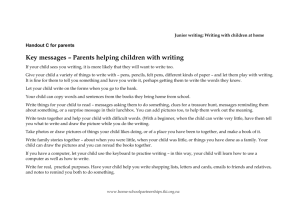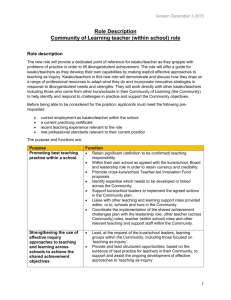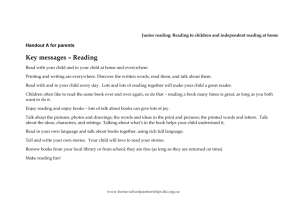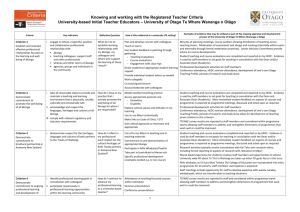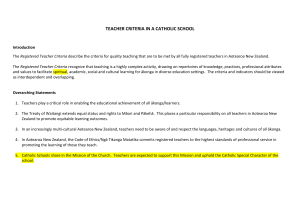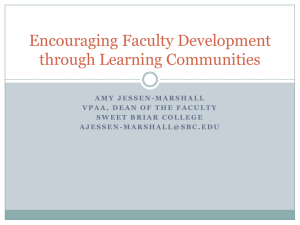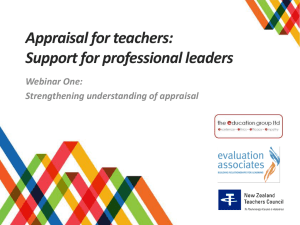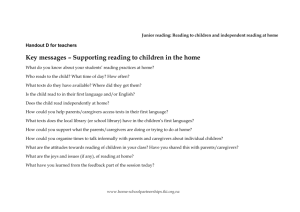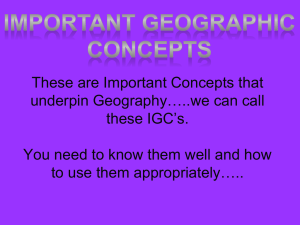Registered Teacher Criteria
advertisement
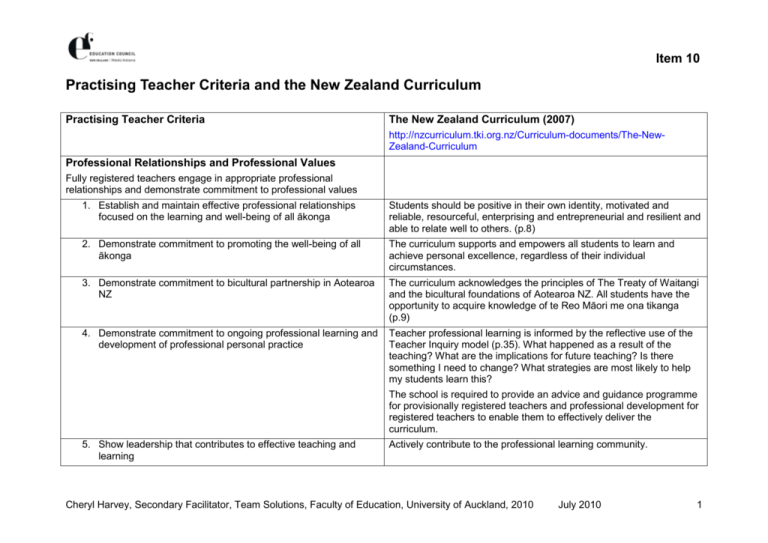
Item 10 Practising Teacher Criteria and the New Zealand Curriculum Practising Teacher Criteria The New Zealand Curriculum (2007) http://nzcurriculum.tki.org.nz/Curriculum-documents/The-NewZealand-Curriculum Professional Relationships and Professional Values Fully registered teachers engage in appropriate professional relationships and demonstrate commitment to professional values 1. Establish and maintain effective professional relationships focused on the learning and well-being of all ākonga Students should be positive in their own identity, motivated and reliable, resourceful, enterprising and entrepreneurial and resilient and able to relate well to others. (p.8) 2. Demonstrate commitment to promoting the well-being of all ākonga The curriculum supports and empowers all students to learn and achieve personal excellence, regardless of their individual circumstances. 3. Demonstrate commitment to bicultural partnership in Aotearoa NZ The curriculum acknowledges the principles of The Treaty of Waitangi and the bicultural foundations of Aotearoa NZ. All students have the opportunity to acquire knowledge of te Reo Māori me ona tikanga (p.9) 4. Demonstrate commitment to ongoing professional learning and development of professional personal practice Teacher professional learning is informed by the reflective use of the Teacher Inquiry model (p.35). What happened as a result of the teaching? What are the implications for future teaching? Is there something I need to change? What strategies are most likely to help my students learn this? The school is required to provide an advice and guidance programme for provisionally registered teachers and professional development for registered teachers to enable them to effectively deliver the curriculum. 5. Show leadership that contributes to effective teaching and learning Actively contribute to the professional learning community. Cheryl Harvey, Secondary Facilitator, Team Solutions, Faculty of Education, University of Auckland, 2010 July 2010 1 Item 10 Professional Knowledge in Practice Fully registered teachers make use of their professional knowledge and understanding to build a stimulating challenging and supportive learning environment that promotes learning and success for all ākonga. 6. Conceptualise, plan and implement an appropriate learning programme The curriculum reflects New Zealand’s cultural diversity and values the histories and traditions of all its people (p.9). Students are at the centre of teaching and learning. They should experience a curriculum that engages and challenges them, is forward-looking and inclusive, and affirms NZ’s unique identity. The learning programme needs to offer integrated opportunities to build the key competencies of Thinking, Using Language Symbols and Texts, Managing Self, relating to Others and Participating and Contributing (pp12,13). The teacher should be conversant with the curriculum levels and the achievement objectives of their subject area and use these in planning and implementing. 7. Promote a collaborative supportive learning environment The curriculum has meaning for students, connects with their wider lives, and engages the support of their families, whanau and communities (p.9). The curriculum offers all students a broad education that makes links within and across learning areas, provides for coherent transitions, and opens up pathways to further learning. The teacher provides effective management of the learning setting through trust, respect and the building of relationships. 8. Demonstrate in practice their knowledge and understanding of how ākonga learn The curriculum encourages all students to reflect on their own learning processes and to learn how to learn (p.9). Students need to be literate and numerate, critical and creative thinkers, active seekers, users, and creators of knowledge, informed Cheryl Harvey, Secondary Facilitator, Team Solutions, Faculty of Education, University of Auckland, 2010 July 2010 2 Item 10 decision makers and effective users of communication tools. To be effective the teacher must create a supportive learning environment, enhance the relevance of new learning, facilitate shared learning, make connections to prior learning and experience, provide sufficient opportunities to learn, inquire into the teaching – learning relationship (pp34,35). Elearning has considerable potential to support teaching approaches while enabling learners to make connections, use shared learning, benefit from personalized learning and virtual experiences which allow students to take their learning further p.36). 9. Respond effectively to the diverse and cultural experiences and the varied strengths, interests and needs of individuals and groups of ākonga The curriculum is non-sexist, non-racist, and non discriminatory; it ensures that students’ identities, languages, abilities, and talents are recognized and affirmed and that their learning needs are addressed (p.9) A culturally responsive pedagogy is employed. 10. Work effectively within the bicultural context of Aotearoa NZ The curriculum has meaning for students, connects with their wider lives, and engages the support of their families, whanau and communities (p.9) 11. Analyse and appropriately use assessment and information, which has been gathered formally and informally The primary purpose of assessment is to improve students’ learning and teachers’ teaching. Assessment is an ongoing process that arises out of the interaction between teaching and learning. Assessment provides evidence of student progress (p.39, 40). 12. Use critical inquiry and problem-solving effectively in their professional practice. Teachers must inquire into the impact of their teaching on students, using the Teaching as Enquiry Model (p.35) Provisionally registered teachers must keep a reflective journal which documents their 2 year learning journey on their advice and guidance programme. Details of what must be in this journal can be found at http://www.educationcouncil.org.nz/registration/how/full/new.stm#h1 Cheryl Harvey, Secondary Facilitator, Team Solutions, Faculty of Education, University of Auckland, 2010 July 2010 3 Item 10 Useful websites Key competencies http://keycompetencies.tki.org.nz/ NZ Curriculum http://nzcurriculum.tki.org.nz/Curriculum-documents/The-New-Zealand-Curriculum NCEA http://www.nzqa.govt.nz/ncea/ Subject specific resources http://www.nzqa.govt.nz/ncea/resources/index.html Support materials for PRTs http://prtteamsolutions.wikispaces.com Education Council http://www.educationcouncil.org.nz Ministry of Education http://www.minedu.govt.nz/ Assessment Resource Banks (Maths, Science, English) http://www.nzcer.org.nz/default.php?products_id=600 Literacy Online http://literacyonline.tki.org.nz/ Cheryl Harvey, Secondary Facilitator, Team Solutions, Faculty of Education, University of Auckland, 2010 July 2010 4
